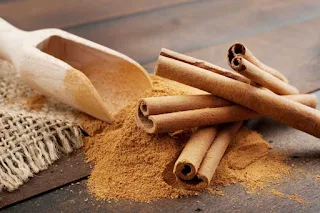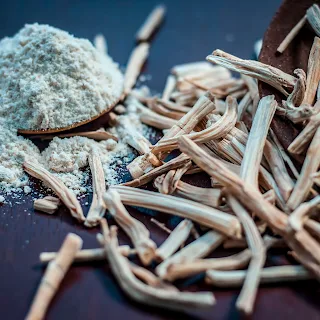Cinnamon (Dalchini) is a dried bark of a small tree (Cinnamomum Zeylanicum) growing mainly in western/southern parts of India. It is one of the oldest and important spices available in Indian kitchens as part of ‘Garam Masala’. It is characterized by special flavor and aroma due to its essential oils. It is available in market in dried and rolled sticks. Its leaves are commonly called as ‘Tejpatra’.
Dalchini has been described as ‘Tvak’ in Ayurveda and used in various ailments like flu, indigestion, edema and cough etc. As per Ayurveda, its taste is pungent, sweet and hot in nature. It is light, rough, penetrating and often recommended for people with the Kapha vata constitution.
How To Use
Powder of the bark can be infused with warm water and honey to reap its benefits. The essential oil from the cinnamon bark also has soothing effects on the mind and body.
Amazing Benefits of Cinnamon
Improves Digestion
A natural digestive with hot potency, powdered bark of cinnamon boosts digestion, relieves flatulence, abdominal pain, diarrhea, dyspepsia, irritable bowel syndrome and also improves liver function. Adding it with other spices or sprinkling it on everyday foods removes AMA toxins from the body, improves absorption of nutrients from food, promotes digestion and also helps in burning belly fat.
A cup of cinnamon tea is extremely beneficial in treating gut anomalies and improving digestion and appetite. Drinking it once a day also helps in shedding a few kilos.
Relieves Cough and Cold
The penetrating quality (i.e. tikshna guna) of cinnamon liquefies the mucus or sputum (kapha), serves as an expectorant and expels mucus from the body. Powder or oil of the bark exhibits potent antitubercular activity and is extremely beneficial for cough, cold, asthma, headache and tuberculosis.
Consume a kadha made of cinnamon stick soaked warm water along with a few drops of honey and a pinch of ginger juice about two-three times a day to get relief from congestion and sore throat.
Manages Diabetes
Cinnamon holds high significance in ancient ayurvedic treatments for managing type 2 diabetes. It regulates the production of insulin, the key hormone of diabetes, reduces insulin resistance by the body and thereby reduces the blood sugar level. Regular intake of cinnamon supplements or adding a pinch of it to your diet can show marked improvement in maintaining your glycemic level.
According to a study published in the Diabetes Care Journal [1], cinnamon was a highly effective remedy against diabetes, especially type 2 diabetes. The study stated that the spice has the ability to improve one s glucose levels and lipid levels by activating his/her insulin receptors. It also reduces the total serum glucose, triglycerides and the total cholesterol of a person since it stimulates the enzyme systems that regulate one s carbohydrate metabolism. Cinnamon also has amazing vasodialatory properties that help beat the risk of cardiovascular disease a common condition seen in diabetics
Alleviates Cardiac Ailments
Several traditional texts vouch by this potent bark for combating heart problems. The essential oils present in the bark of cinnamon make it a natural blood thinner and reduces blood coagulation in the arteries, treats atherosclerosis, check high blood pressure and promote a healthy heart. Adding a small bark of cinnamon to your tea or food purifies your blood and keeps heart problems at bay.
Enhances Skin Health
The anti-inflammatory property of cinnamon is beneficial for fighting acne, pimples and other skin infections. Ayurveda strongly suggests that regular use of cinnamon oil for increasing the production of collagen and elastin, thus treating the signs of aging. Apply a paste of the bark or oil on your affected area to achieve healthy glowing skin.
Mix 1 tbsp of cinnamon powder with 2-3 tsp of honey to form a paste. Apply this mix on the face-covering acne and pimples. Wash it off with lukewarm water after 10 minutes.
useful in Arthritis
Powered with strong analgesic, anti-inflammatory, and pain-relieving properties of the bio-active components, cinnamon decreases cytokines which are linked to arthritic pain and thus offers extensive relief from pain and inflammation in case of rheumatoid and osteo arthritis and joint pain. Being a natural vasodilator, it is also used to treat painful muscle spasms, sore muscles, arthritic conditions, and other inflammatory issues.
Alleviates Cardiac Ailments
Several traditional texts vouch by this potent bark for combating heart problems. The essential oils present in the bark of cinnamon make it a natural blood thinner and reduces blood coagulation in the arteries, treats atherosclerosis, check high blood pressure and promote a healthy heart. Adding a small bark of cinnamon to your tea or food purifies your blood and keeps heart problems at bay.
Enhances Skin Health
The anti-inflammatory property of cinnamon is beneficial for fighting acne, pimples and other skin infections. Ayurveda strongly suggests that regular use of cinnamon oil for increasing the production of collagen and elastin, thus treating the signs of aging. Apply a paste of the bark or oil on your affected area to achieve healthy glowing skin.
Mix 1 tbsp of cinnamon powder with 2-3 tsp of honey to form a paste. Apply this mix on the face-covering acne and pimples. Wash it off with lukewarm water after 10 minutes.
useful in Arthritis
Powered with strong analgesic, anti-inflammatory, and pain-relieving properties of the bio-active components, cinnamon decreases cytokines which are linked to arthritic pain and thus offers extensive relief from pain and inflammation in case of rheumatoid and osteo arthritis and joint pain. Being a natural vasodilator, it is also used to treat painful muscle spasms, sore muscles, arthritic conditions, and other inflammatory issues.
Helps protect you from cancer:
In a study done by the USDA (United States Agricultural Department), it was found that cinnamon extract was a potent weapon against leukaemia and lymphomas. The study found that the extract worked by blocking the path of certain components that were important for the regeneration of the cell, inhabited the further multiplication of cancerous cells, and slowly reduced their spread. It also found that the higher the amount of extract the better the results. Remarkably, the extract only inhibited the growth of unhealthy cells and left the healthy cells untouched unlike conventional therapies like chemotherapy, etc.
Treats Candidiasis
The abundance of anti-bacterial and anti-fungal qualities in cinnamon plays a pivotal role in treating various microbial infections like candida, ringworm, athlete’s foot, and many more. Not only can cinnamon improve general body immunity against infections when drank as a tea but also help in reducing inflammation and facilitate wound healing when applied onto the affected area in the form of diluted essential oil.
Treats Candidiasis
The abundance of anti-bacterial and anti-fungal qualities in cinnamon plays a pivotal role in treating various microbial infections like candida, ringworm, athlete’s foot, and many more. Not only can cinnamon improve general body immunity against infections when drank as a tea but also help in reducing inflammation and facilitate wound healing when applied onto the affected area in the form of diluted essential oil.
Can help delay the onset of Alzheimer s: A study conducted at the Tel Aviv University found that the extract of cinnamon, when administered on a daily basis to patients with Alzheimer s improved their longevity and bettered the locomotor defects they experience once afflicted with the disease. Cinnamon extract also known as CEppt, inhibits tau aggregation (tau is a type of protein that aggregates around that part of the nerves that is responsible for transmitting impulses of the brain) and filament formation (a process that is thought to be due to the accumulation of tau protein) which in turn protects the brain from the onset of Alzheimer s and can also help in slowing down the progression of the disease
Uplifts Tooth And Gum Health
Cinnamon is widely used in various oral solutions owing to its strong anti-microbial nature. It not only restricting the spread of infectious microbes within the oral cavities, but also promotes the growth of good probiotic bacteria thus cleansing the tooth, preventing bad breath, cavities, and tooth decay. Try oil pulling with a drop of cinnamon oil in coconut oil or just sip gently sweetened cinnamon tea to augment teeth and gum health.
Uplifts Tooth And Gum Health
Cinnamon is widely used in various oral solutions owing to its strong anti-microbial nature. It not only restricting the spread of infectious microbes within the oral cavities, but also promotes the growth of good probiotic bacteria thus cleansing the tooth, preventing bad breath, cavities, and tooth decay. Try oil pulling with a drop of cinnamon oil in coconut oil or just sip gently sweetened cinnamon tea to augment teeth and gum health.
Helps beat acne:
Cinnamon is a common spice and flavouring agent but the essential oil it contains also has strong anti-microbial properties. The water activity of honey is very low and this means that it does not contain a lot of moisture which can promote the growth of microorganisms. Considering that pimples often arise from an infection within the pores of the skin, combining cinnamon with honey is an effective remedy.
Helps with weight loss: Cinnamon is a common spice and flavouring agent but the essential oil it contains also has strong anti-microbial properties. The water activity of honey is very low and this means that it does not contain a lot of moisture which can promote the growth of microorganisms. Considering that pimples often arise from an infection within the pores of the skin, combining cinnamon with honey is an effective remedy.
Cinnamon has great digestive properties, it helps with weight loss by regulating the breakdown of carbohydrates and the production and use of insulin by the body. It also helps improve the digestion and assimilation of food within the body, helping one lose weight.
Drink cinnamon tea with a teaspoon of honey every day, half an hour before breakfast. Alternatively you could add cinnamon powder to your meal by sprinkling it on your salad, coffee or other foods.
Drink cinnamon tea with a teaspoon of honey every day, half an hour before breakfast. Alternatively you could add cinnamon powder to your meal by sprinkling it on your salad, coffee or other foods.

.png)




